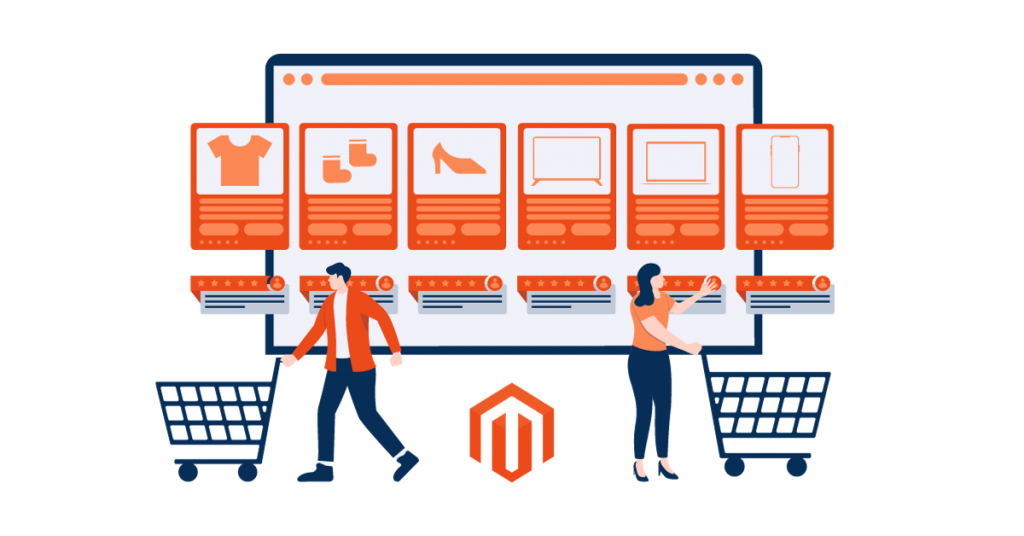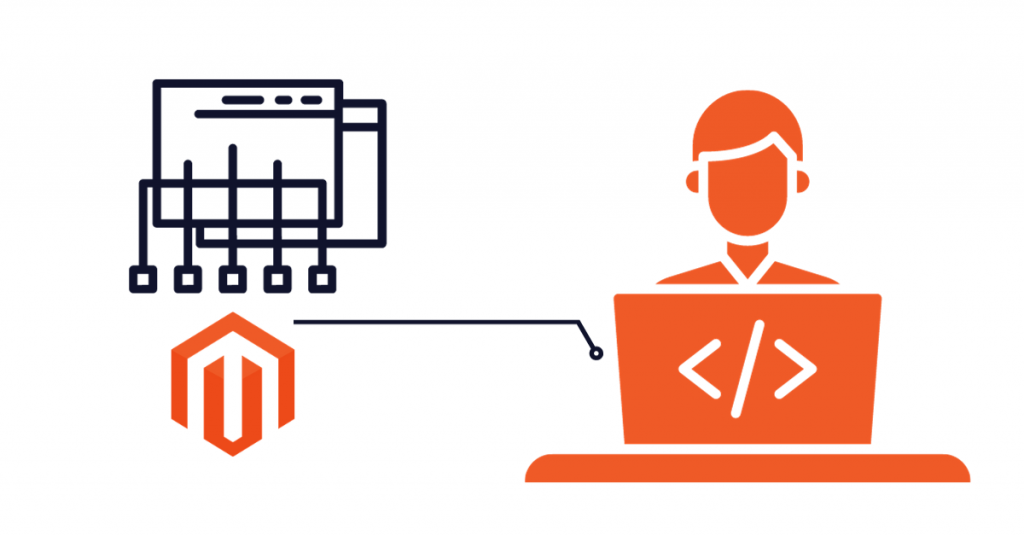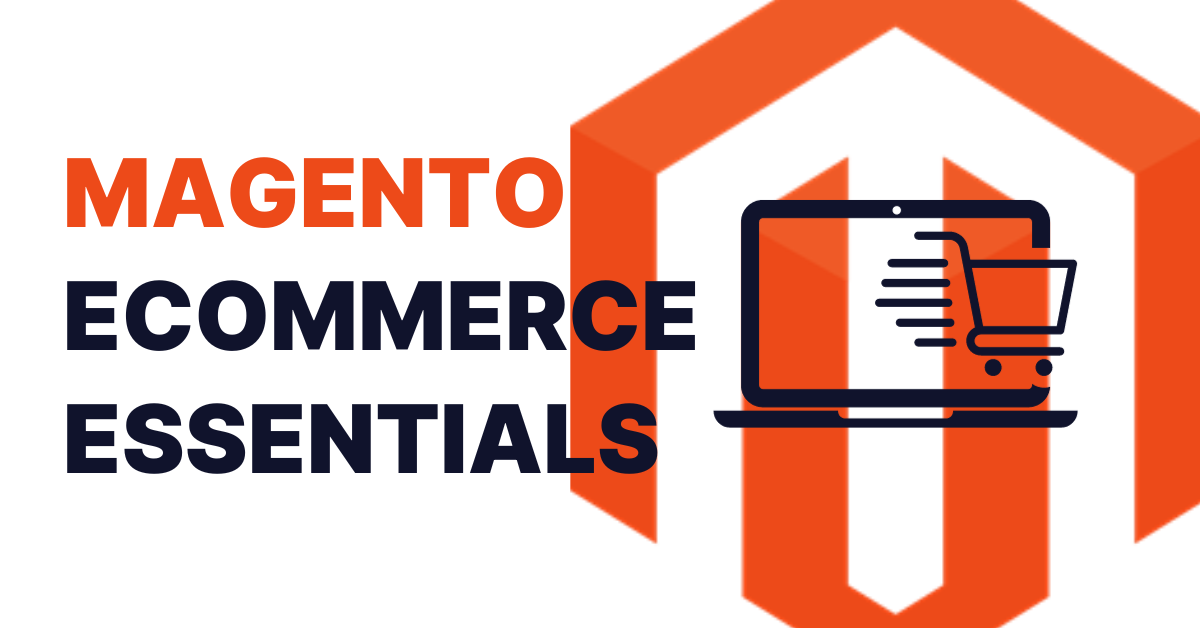Creating a robust and efficient online store is the key to success for retailers. Magento, an open-source eCommerce platform, has been empowering businesses of all sizes to build and manage their online stores with ease. With its comprehensive suite of features and scalable solutions, Magento continues to be a popular choice for merchants seeking to enhance their online presence and achieve growth.
But what makes Magento stand out among other eCommerce platforms?
In this blog post, we’ll explore the numerous benefits of using Magento, like its extensive customization options, data protection, PCI compliance, and Magento eCommerce cost.
Key takeaways
- Magento eCommerce provides comprehensive and versatile solutions for businesses of all sizes, enabling them to create and manage their stores easily
- Initial setup & customization expenses can range from $2,500-$50,000, while ongoing operational costs are typically between $10-$500/month
- Magento offers a variety of marketing tools: SEO strategies, PPC campaigns, and personalized content experiences to enhance customer engagement.
Magento’s eCommerce solutions

Magento eCommerce offers two distinct solutions for different business sizes and requirements: Magento Open Source and Adobe Commerce. Both platforms provide a versatile and powerful foundation for online retailers, allowing them to easily create and manage their stores.
Whether you’re an emerging business looking for a solid launchpad or a large enterprise seeking to scale new heights in eCommerce, Magento features have got you covered with rich software and extensive commerce capabilities.
Magento Open Source for emerging businesses
Magento Open Source is an ideal choice for small and medium-sized businesses, offering a free, customizable platform. It provides a comprehensive suite of features, including:
- Product management
- Catalog management
- SEO tools
- Multi-store capabilities
With Magento Open Source, emerging businesses can create unique online stores and expand their reach to global markets.
Although you can download Magento Open Source for free, don’t forget to factor in the additional costs for:
- Website maintenance
- Backups
- Domain name
- Web hosting
- Customizations
- PCI compliance
Adobe Commerce: scaling new heights
For larger businesses with more complex needs, Adobe Commerce is the ideal solution. As a comprehensive cloud service based on Magento Commerce, Adobe Commerce is now part of the Adobe Experience Cloud. With the power of Adobe Commerce Cloud, this platform is designed to accommodate businesses with higher average order values and annual online revenues, with prices starting at $2,000 per month. It offers advanced capabilities, scalability, and dedicated customer service to help businesses thrive.
The cost of running a Magento store

If you’re thinking about using Magento for your eCommerce store, you need to understand the costs. Magento eCommerce price involves initial setup and customization expenses and regular operational costs. Let’s break it down!
Initial setup and customization expenses
How much does Magento eCommerce cost? The initial costs associated with launching a Magento store include:
- Web development—costs can range from $2,500 for a simple Magento website to $15,000/year for a primary Magento web store with standard functions
- Design—costs will vary depending on the complexity and customization required
- Necessary integrations—costs will depend on the specific integrations needed for your store.
Hiring a Magento developer can cost anywhere from $25 to over $200 per hour.
Design costs can vary depending on the complexity and customization, ranging from $1,500 to $50,000. Furthermore, expenses associated with necessary integrations can range from $60 to $600 per extension, with development costs for integrating these extensions ranging from $1,800 to $10,000 or more.
Ongoing operational costs
In addition to the initial setup costs, running a Magento store involves ongoing operational costs, such as hosting, upkeep, and updates. Hosting costs typically range between $10 and $50/month, while routine maintenance services may cost between $100 and $500 per month, depending on store size and complexity factors.
Considering these expenses while planning your Magento store is vital for a seamless and fruitful eCommerce journey.
Magento for developers
Magento is a developer’s dream. It offers a robust platform with a variety of integration, extensibility, and custom development options. The open-source nature of Magento, coupled with its flexible codebase, performance-enhancing features, and reliable infrastructure, make it a powerful tool for eCommerce website development.

Here’s how Magento developers can create distinctive and successful online stores.
Integration and extensibility
Seamless integration with various third-party services and tools is one of Magento’s key strengths. Magento provides developers with different integration and extensibility options, including the capacity to create custom extensions, integrate with third-party services, and employ APIs to connect with other systems. This flexibility allows developers to build tailored eCommerce solutions that cater to the specific needs of their clients and their businesses.
Custom development and Magento extensions
Custom development is at the heart of Magento’s appeal. By leveraging Magento extensions, developers can create unique features and functionality that set their clients’ online stores apart from the competition. Nonetheless, be mindful of potential risks and issues with using Magento extensions, including loss of PCI compliance, absence of security patches, ransomware, and vulnerabilities within the extension base. Maintaining and updating extensions regularly is recommended to help reduce these risks.
Security and compliance in the Magento ecosystem

Security and compliance are critical aspects of any eCommerce platform, and Magento is no exception. With a commitment to data protection and PCI compliance, Magento offers businesses peace of mind when it comes to safeguarding their customers’ sensitive information.
Next, let’s discuss how Magento guarantees data protection and PCI compliance via regular updates and security patches.
Data protection and PCI compliance
Magento eCommerce employs a range of security measures to protect customer data, including:
- The Magento Security Scan to detect and prevent cyberattacks
- SSL certificates for data encryption
- Regular store updates with security patches and updates
- Industry-standard encryption algorithms, such as AES-256, guarantee data security.
By implementing these measures, Magento helps businesses maintain PCI compliance, which is mandatory for eCommerce merchants that process, store, and transmit cardholder data.
Update management and security patches
Regular updates and security patches play a vital role in maintaining a secure eCommerce environment. Magento issues quarterly security patches, and users are notified of these updates through official Magento websites, community forums, and newsletters. Failing to keep Magento patches and updates current can result in security vulnerabilities, loss of customer confidence, diminished performance, and compliance violations.
By staying up-to-date with the latest security patches and updates, businesses can ensure their Magento stores’ ongoing security and compliance.
Magento’s marketing tools
When you have your Magento eCommerce store set up, engaging customers is paramount to success. Magento features a range of marketing tools designed to help businesses optimize their online presence and drive customer engagement. From SEO strategies to PPC campaigns and personalized marketing through Adobe Target, Magento provides businesses with the tools they need to reach their target audience and increase conversions.

Search Engine Optimization strategies
Magento SEO services include strategies that help businesses improve their search engine rankings and increase online visibility. With features such as Google sitemap creation, SEO-friendly URLs with rewrite control, and editable metadata at both product and category levels, Magento makes it easy for businesses to optimize their online presence and attract more organic traffic.
Additionally, Magento’s layered navigation enhances SEO performance by providing a user-friendly way for visitors to browse and filter products on your site while also helping to avoid potential SEO issues, like duplicate content.
Pay-Per-Click strategies
PPC managed services and strategies are essential for driving targeted traffic to your Magento store and increasing conversions. Magento provides a range of PPC strategies to optimize customer engagement: Magento PPC Management, expert Magento PPC campaigns, and revenue attribution. By leveraging these strategies, businesses can reach their target audience, increase brand visibility, and monitor the success of their PPC campaigns.
Personalized marketing with Adobe Target
Adobe Target integrates with Magento to enable personalized marketing efforts. This integration allows marketing managers to monitor and analyze customer data, customize the website based on future behavior, and deliver tailored content at scale.
With Adobe Target, Magento users can leverage dynamic content capabilities to personalize banners, messaging, and product lists in real time, providing an enhanced customer experience that drives engagement and conversions.
Magento across devices: mobile and multiplatform strategy
You’ve probably noticed that seamless customer experience across all devices and platforms is something a lot of users value highly. Magento recognizes this need and offers robust support for mobile optimization and multiplatform strategies.
By ensuring a consistent and engaging user experience across desktop, mobile, and tablet devices, Magento features enable businesses to effectively serve their customers no matter how they choose to interact.
Optimizing for mobile devices
Magento ensures mobile-friendly design and functionality for an optimal user experience on smaller screens. Here are some effective strategies for optimizing Magento stores for mobile devices:
- Implementing a responsive design
- Optimizing visuals for mobile devices
- Simplifying navigation
- Using mobile-friendly checkout processes
- Ensuring a seamless shopping experience on mobile devices.
With these strategies, you can provide a better user experience for mobile users and increase conversions on your Magento store.
Creating a unified multiplatform experience
Magento creates a unified multiplatform experience by offering a single, multi-channel commerce platform with a unified backend and a flexible, customizable frontend. This allows businesses to create consistent experiences across eCommerce platforms like websites, mobile apps, and social media channels.
With the offered Magento features, businesses can:
- Manage multiple online stores from a single admin panel
- Support different languages, products, and currencies
- Deliver a seamless and cohesive experience to customers across various touchpoints.
Magento Association and community support
The Magento Association and community support play a crucial role in the success of Magento as an eCommerce platform. Providing valuable resources, hosting events, and supporting developers utilizing Adobe Commerce and Magento Open Source, the Magento Association fosters a thriving and collaborative ecosystem.
Next, we will discuss the benefits of the Magento Association and community support and their contribution to helping businesses.
Community knowledge and resources
By tapping into the wealth of community knowledge, businesses can gain insights, access expert advice, and address challenges more effectively. Magento users can leverage the following Magento eCommerce community resources for guidance and problem-solving:
- A network of developers and enthusiasts
- More than 3,700 plugins on the Magento Marketplace
- Forums for exchanging information
- The official Magento website for learning and discovery
- Magento Education resources include the eCommerce Resource Library, webinars, and knowledge base.
Collaboration with Magento partners
Collaborating with Magento eCommerce partners can provide businesses access to knowledgeable developers, dependable assistance, and cost-efficient solutions to ensure you have the expert advice and support needed to build and maintain a successful online store. Magento partners offer a range of services, such as Magento store development, design, implementation, support, maintenance, site migration, upgrades, integrations, and custom B2C and B2B solutions.
Migration to Magento
Transitioning to Magento requires careful planning and consideration, especially when upgrading from Magento 1 to Magento 2. While the benefits of Magento 2 are numerous, the migration process can be complex and may require additional migration in the future.
Next, we will discuss the key aspects to take into account when planning your Magento migration and how to guarantee a seamless and successful shift to the Magento platform.
Preparing for Magento migration
Before migrating to Magento, it’s essential to assess your current store setup and requirements. By thoroughly reviewing your current store and identifying your unique needs, you can better plan your Magento migration and ensure a seamless transition to the new platform. This review includes:
- Evaluating your products and categories
- Reviewing customer data
- Assessing customizations
- Analyzing website performance
- Checking SEO and analytics
- Considering server requirements
Upgrading from Magento 1 to Magento 2
Upgrade from Magento 1 to Magento 2 involves a complex process that requires a full replatforming rather than a simple data migration. Businesses must consider technical knowledge and developer resources necessary for installation and configuration, stakeholder buy-in, detailed implementation plans, and associated developer and design costs.
Additionally, there is no guarantee of continued support from Magento for Magento 1 extensions, so businesses must be prepared to re-implement any necessary third-party extensions in Magento 2.
Magento companies
Magento companies specialize in Magento development, design, and support. By partnering with a Magento company, businesses can access expert services to help them build and maintain a successful online store, as well as ensure that their online stores are optimized for performance, security, and customer engagement.
Services offered by a Magento company are designed to support businesses in creating and sustaining successful online stores. These services include:
- Magento store development
- Marketplace setup
- Mobile app development
- Theme customization
- Migration
- Extension development
- and more!
Best Magento companies
When it comes to finding the right Magento company for your eCommerce needs, you have to consider factors such as experience, expertise, customization options, support and maintenance, pricing, communication, and reputation. Some of the leading Magento development companies include scandiweb, Ziffity Solutions LLC, Rave Digital, The Commerce Shop, GoMage, Aureate Labs, eSparkBiz, Panda Group, B4SPOT, and Luxinten.
Summary
Magento offers a powerful and flexible platform for eCommerce businesses of all sizes. With its extensive customization options, commitment to data protection and PCI compliance, and a vibrant community of developers and partners, Magento empowers businesses to build and maintain successful online stores. By leveraging Magento’s unique features and capabilities, companies can create engaging and secure shopping experiences for their customers, ensuring long-term eCommerce success.
scandiweb is a full-stack Magento agency with 15+ years of experience and the largest Magento-certified developer team in the world. Start your journey with us with a free consultation!
Frequently Asked Questions
Is Magento the same as Shopify?
Despite having some similarities, Shopify and Magento are different platforms. Shopify is more user-friendly but limited in features and customization, while Magento is more complex but offers advanced features and customization options. Moreover, the pricing plans for each platform are also significantly different.
How much does Magento cost?
Magento web development costs range from $2,500 for a simple website to $15,000/year. Hiring a Magento developer can cost anywhere from $25 to over $200 per hour. Design and integration costs will vary depending on the complexity and customization required, ranging from $1,500 to $50,000 for design and $60 to $600 per extension, with development costs for integrating these extensions ranging from $1,800 to $10,000 or more.
Is Magento a good eCommerce platform?
For businesses looking for a professional and long-term eCommerce solution, Magento is an excellent choice. It provides a powerful open-source platform while also being free of cost.
Is Magento better than WooCommerce?
Magento provides features such as product reviews, grouped items, wish lists, advanced pricing rules, and product personalization that WooCommerce lacks without purchasing additional extensions. Moreover, Magento comes with multi-language options, multi-store capabilities, and complex configurable products right out of the box. Both platforms are highly extensible, with plugins, themes, and add-ons.
What features does Magento offer for developers?
Magento provides developers an open-source platform, multiple features, and a customizable codebase for creating effective eCommerce solutions.



Share on: